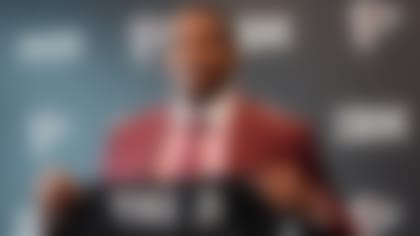New York Giants general manager Dave Gettleman finally gave Odell Beckham the contract he desired last August. Seven months later, Beckham is gone at a considerable cost to the franchise's credibility.
There will be a lot of talk about what New York received from the Cleveland Browns in a trade that will overshadow the rest of this free agency period, with the No. 17 overall pick, a third-round selection (No. 95 overall) and safety Jabrill Peppers going to the Meadowlands. I'm more interested in what the G-Men gave up.
Beckham, one of the transcendent players to enter the league this decade, will still cost Big Blue $16 million in dead-cap money this year and $5 million more a year from now. Because the Giants changed their minds. After years of saying that "you don't give up on talent," Gettleman shipped out his best player. The Giants said they would have to be "blown away" to consider giving up Beckham, yet he went for a similar draft pick haul to what Sam Bradford inspired before the 2016 season, with a mid-level starting safety in Peppers thrown in. This is a trade that indicates they were pressing to trade Beckham regardless of what they were offered.
Trading Beckham a year ago would have seemed short-sighted. Trading him now, just after handing him that contract, makes the Giants look like a franchise adrift. So long an organization praised for stability, will Gettleman and ownership be patient with coach Pat Shumur or will he be on the hot seat in his second season like Ben McAdoo was just two years ago?
The 2019 season should be Eli Manning's swan song (again) in New York, and the Giants figure to use some of their new draft capital to ensure they select Manning's successor. If the team drafts Ohio State's Dwayne Haskins or Oklahoma's Kyler Murray, perhaps the young quarterback will help make Giants fans forget about this decision by Gettleman.
But they will only need to look to Cleveland, where Baker Mayfield is throwing to Beckham and his buddy Jarvis Landry, to see the road not traveled. When you have a young franchise quarterback, try to surround him with the best possible players. The Browns went from 0-16 to looking like a playoff team in just 14 short months partly because they aren't building their team in fear. When you have a generational wide receiver, don't trade him away just before the rookie quarterback is about to arrive.
The Beckham trade wasn't the only news that went down on a wild day in the NFL. Twenty-seven of the top 40 free agents, according to our list at NFL.com, have agreed to terms in less than two days since the NFL's negotiating period began. While there may not be that much drama left when free agency officially starts on Wednesday, let's try to make sense below of everything else that transpired Tuesday. (My eight takeaways from Monday can be seen right here.)
1) Le'Veon Bell is money well spent.
Money has been the sole focus of the Le'Veon Bell conversation for so long that his brilliance as a player has been forgotten. The details of Bell's four-year, $52 million contract with the New York Jets, including the guarantee structure, are secondary. In a free-agent market where Trent Brown, Ja'Wuan James and Za'Darius Smith are paid like proven superstars, the Jets got the genuine article. Bell is a true difference maker, year after year, snap after snap. Are those guys?
Bell will change how defenses can attack the Jets. He's a complete player who can double as a slot receiver and become a fierce protector of Sam Darnold. Bell can handle short-yardage situations with aplomb and create extra yards, all with a singular style that is brilliant to watch. The Jets paid Trumaine Johnson $18 million per year last offseason. Even the Jets giving linebacker C.J. Mosley$17 million per year with $51 million guaranteed seems like a bigger risk because Mosley too often looks ordinary.
Bell's greatness is unquestioned. As a 27-year-old with three seasons of 1,800-plus scrimmage yards already under his belt, he has a chance to put up ridiculous career stats. As big free agency signings go, I believe Bell is a relatively safe bet. It's now on Jets coach Adam Gase and the team's offensive line to help Bell do what he does best: make magic with the ball in his hands.
2) Packers fans can no longer complain about free agency.
Packers fans -- and plenty of analysts -- loved to oversimplify Green Bay's postseason frustrations by blaming former general manager Ted Thompson for not spending in free agency. While Thompson's hardcore draft-and-develop philosophy grew frustrating because virtually any inflexible philosophy grows frustrating, blaming the Packers' sleepy March spending habits for not maximizing Aaron Rodgers' prime was too easy a target, while Mike McCarthy and Dom Capers kept their jobs in perpetuity.
Second-year general manager Brian Gutekunst's spending spree on Tuesday should still pacify the masses, at least until September when new coach Matt LaFleur tests his chops. The Packers essentially swapped out edge rushers Clay Matthews and Nick Perry for the best candidates left on the open market at the position: Preston Smith and Za'Darius Smith. The money is wild, with Za'Darius Smith getting $34.5 million in the first two years of his deal and Preston Smith averaging $13 million per year on his four-year deal. They also added safety Adrian Amos from the Bears on a four-year deal, with $21 million in the first two years.
This is how free agency works. Teams pay promising young starters superstar money and hope for the best. It is often the good-not-great players who push NFL salaries forward because great players don't usually reach free agency. With that said, all three players here are compelling, if unflashy, bets. Za'Darius Smith brings great energy as a pass rusher, even if he's never been an every-down player. Preston Smith is solid against the run and as a pass rusher, reliably topping 750 snaps for the last three seasons. They each ranked in the top-10 3-4 outside linebackers by Pro Football Focus last season and they are in the middle of their primes. If you are going to "overspend" in free agency, do it on players like this.
For a few years, it was trendy for teams to stay "calculated" in March. And then too many teams wound up with too much cap space and that's gone out the window. Green Bay was one of them. As long as the Packers are flexible enough to re-sign the homegrown stars they want, these deals won't be a problem. There is some concern Amos was a product of the Bears' system and it's surprising that his former defensive coordinator, Vic Fangio (now the Broncos' head coach), didn't push to sign him in Denver, but these are the risks you take in free agency.
Unlike LaFleur, Green Bay defensive coordinator Mike Pettine is a veteran. I have faith he can integrate all three players into his system, and the Packers are undoubtedly a younger, faster defense than they were a few days ago. Perry was released on Tuesday and even Matthews' last deal was a reminder that "drafting and developing" and re-signing your own players doesn't guarantee the new contracts work.
3) John Lynch makes his move.
You just knew that 49ers general manager John Lynch was going to make a big splash this month, and the team pretending that new linebacker Kwon Alexander never tore his ACL last season doesn't quite qualify. Tuesday's trade for Dee Ford and the subsequent long-term contract does.
The 49ers gave up a 2020 second-round pick and issued Ford a new contract worth $87.5 million over five years, per NFL Network's James Palmer, to acquire the soon-to-be 28-year-old from the Chiefs in a bid to add pass-rush juice to the sluggish 49ers defense. Ford comes with some risk -- he posted a career-high 13 sacks last year after totaling a combined 17.5 in his first four seasons in the league -- but a pass rusher this fast around the edge isn't going to come cheap. Before the Chiefs placed the franchise tag on Ford, he ranked No. 5 overall on our original Top 101 free agents list.
Combining Ford on the edge with star interior disruptor DeForest Buckner gives the 49ers a chance to establish a defensive identity that has been missing under coach Kyle Shanahan and defensive coordinator Robert Saleh. Lynch is entering his third year running the team, the season where team builders are supposed to have on-field proof that their vision is being realized.
Chiefs general manager Brett Veach isn't under the same pressure. That's partly why the team can risk getting rid of two (Justin Houston and Ford) of the best three players on a defense that already struggled to get stops. Kansas City got a fair enough return for Ford, but releasing Houston and trading Ford away is putting an awful lot of faith in new defensive coordinator Steve Spagnuolo's system rather than trusting in talent. The Chiefs don't seem done yet on defense, which makes sense. Free agency technically hasn't even begun, after all.
4) The Ravens have a lot of work to do.
The three leaders on last season's top-ranked defense are now ex-Ravens: Terrell Suggs, C.J. Mosley and Eric Weddle. Add the departure of Za'Darius Smith to the mix, and new general manager Eric DeCosta has to find solutions. While Ravens fans shouldn't panic about Smith's departure for bananas money because their system creates pass rushers, Jeff Zrebiec of The Athletic wrote a strong article Tuesday that this isn't just business as usual.
The team can survive Suggs leaving town, but it came as a shock. Baltimore desperately wanted to keep Mosley as the successor to Suggs carrying the Ravens' defensive tradition and were willing to pay him $14 million per season, according to Zrebiec. But the Jets paid Mosley even more, which raises questions about why the Ravens weren't more aggressive earlier trying to keep Mosley and why they didn't just use the franchise tag on him. The Ravens ultimately misread the market, like the Texans did with Tyrann Mathieu, losing a player they wanted to keep.
DeCosta has publicly said he wants to keep Baltimore's defense as the team's identity, with the understanding that building an offense around Lamar Jackson could take time. (With John Brown gone, the team's No. 2 receiver is ... Chris Moore?) The cupboard is hardly barren on defense, but this is more change in one offseason than we've ever seen in Baltimore, with a new general manager, new quarterback and a lot of new questions on defense
UPDATE: On Wednesday, the Ravens got to work. They are expected to sign the top free agent still available -- Earl Thomas -- and hard-nosed former Saints RB Mark Ingram.
5) Every once in a while, it's not about the money.
Anthony Barr agreed to terms with the Jets on Monday, didn't feel right about it, and changed his mind, opting to re-sign with the Vikings. His contract with Minnesota is generous ($33 million guaranteed on a five-year deal worth $67.5 million), but he reportedly is taking less money than the Jets were offering.
I think the Jets were saved from a bad move. Asking Barr to essentially change positions to a 3-4 outside linebacker mid-career just because defensive coordinator Gregg Williams believed Barr could pull it off sounded like a risky bet at best. The Vikings know what Barr does best and can cater to his skill set. Then again, NFL Network's Charley Casserly pointed out during a surprise guest pop on "The Around the NFL Podcast" on Tuesday that the timing of Barr's change of heart hurt the Jets. Gang Green wanted a pass rusher. While they were busy trying to lock up Barr, other players (like Za'Darius Smith and Preston Smith) found other homes.
While there was surely less overall money at stake in the pursuit of quarterback Teddy Bridgewater, NFL Network's Jane Slater reported that Bridgewater chose to stay in New Orleans as Drew Brees' heir apparent for less money than the Dolphins were offering. Bridgewater would have also had a chance to start in Miami, but I suspect both contracts were ultimately for backup money. With no guarantees in Miami, Bridgewater made a savvy move to continue to learn under Sean Payton rather than enter another three-way quarterback battle for a woebegone AFC East team. Partly because of the lack of teams looking for quarterbacks, Bridgewater didn't find a suitor that viewed him as a true No. 1 quarterback. Still just 26, he's better off playing the long game in New Orleans even if it means shorter money in the present.
6) John Elway will keep taking swings on the offensive line.
It's hard to figure out a coherent plan when it comes to the Broncos' offensive line, a problem area that has bedeviled executive John Elway for even longer than his quarterback conundrum. Handing former Dolphins right tackle Ja'Wuan James a contract worth nearly $13 million per season is another attempt to solve a tackle problem that Elway has thrown money and draft picks at over the years. James was quickly called the highest-paid right tackle in the league, although that may not be true if the Raiders put Trent Brown on the right side and keep Kolton Miller on the left, as The Athletic's Vic Tafur reported. But the move to sign James continued a trend of Elway seeming ambivalent about his own quality starters like center Matt Paradis and cornerback Aqib Talib a year ago, while not hesitating to spend money on other teams' starters like James and cornerback Kareem Jackson.
7) The Browns' defensive line is scary.
The Odell Beckham trade will understandably get all the attention, but what the Browns did on defense should not be ignored. They gave Sheldon Richardson the long-term deal he craved for so long. After one-year contracts in Seattle and Minnesota, the Browns reportedly gave Richardson $21.5 million guaranteed on a three-year deal. It couldn't be a better situation for Richardson to avoid double teams next to Myles Garrett, Larry Ogunjobi and Olivier Vernon. Emmanuel Ogbah could be the best third defensive end in the league. New defensive coordinator Steve Wilks has a chance to rebuild his coaching stock quickly after his miserable year in Arizona and those sky-high expectations in Cleveland will absolutely be warranted, in large part because of the defense.
8) The Bills are original thinkers.
Buffalo general manager Brandon Beane is that guy on draft day who makes a lot of surprising picks, a clear sign of an evaluator who sees players differently than others. It remains to be seen whether Beane's approach works, but I appreciate that he has a clear vision of what he wants and he's going for it. After agreeing to terms with wideouts Cole Beasley and John Brown and tackle Ty Nsekhe on Tuesday, the Bills have now locked up *eight* players in free agency, also including Mitch Morse, Tyler Kroft, Kevin Johnson, Frank Gore and Jordan Phillips.
If any player can track down an 80-yard Josh Allen overthrow, it will be Brown. Beasley adds a much-needed slot receiver for a team short on professional wideouts. Coach Sean McDermott has shown he can do a nice job maximizing value from defensive players, so it's on Allen and the offense to fulfill Beane's vision.
Follow Gregg Rosenthal on Twitter @greggrosenthal.












